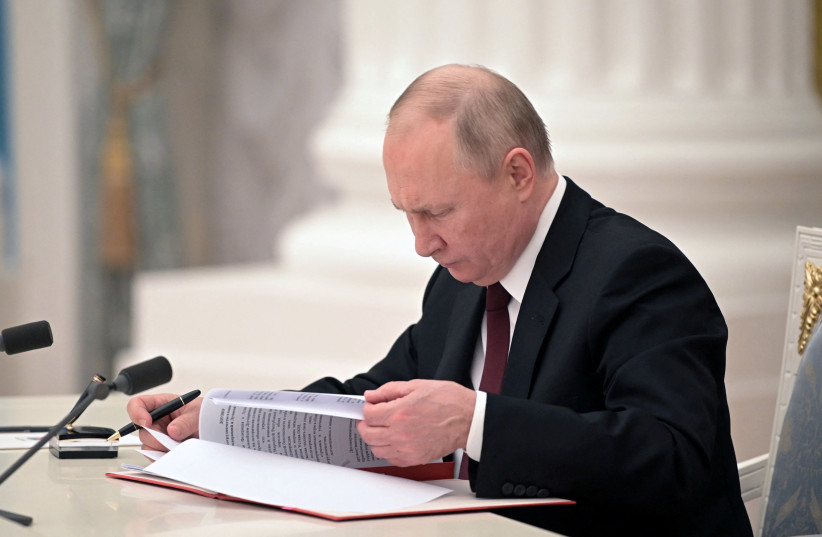The Biden administration was expected to announce on Wednesday it will allow sanctions to move forward on Nord Stream 2 AG, the company in charge of building Russia’s Nord Stream 2 gas pipeline, CNN reported, citing US officials.
Such an action would be part of US-imposed penalties against Russia for President Vladimir Putin’s recognition of independent separatist territories in eastern Ukraine.
Nord Stream 2 AG is a registered Swiss firm whose parent company is the Russian state-owned gas giant Gazprom. The pipeline project was designed to double the direct flow of Russian gas to Germany.
US sanctions target Russian elites and two state-owned banks, excluding them from the US banking system, banning them from trading with Americans and freezing their US assets. They also seek to deny the Russian government access to Western financing.
The US sanctions applied to VEB bank and Russia’s military bank, Promsvyazbank, which specializes in defense deals. Russia’s two largest commercial lenders, Sberbank and VTB, would face American sanctions if Moscow proceeded with its invasion of Ukraine, a US official said

Western nations and Japan on Tuesday punished Russia with new sanctions for ordering troops into separatist regions of eastern Ukraine, and threatened to go further if Moscow launched an all-out invasion of its neighbor.
The United States, the European Union, Britain, Australia, Canada and Japan announced plans to target banks and elites while Germany halted a major gas pipeline project from Russia in one of the worst security crises in Europe in decades.
“I think it’s a start,” says Paul Stronski, a senior fellow in Carnegie’s Russia and Eurasia program, where his research focuses on the relationship between Russia and neighboring countries. He noted that the US sanctions appear stronger than the EU ones thus far.
“Also, the news that we have reached agreement with three Asian allies [Singapore, Taiwan and Japan] on hi-tech sanctions, is a strong warning to Russia,” said Stronski. He went on to say that sanctions against VEB bank is a start, “and more of a warning.”
“I think the sanctioning of family members is key; it is something that the US has been reluctant to do, and it’s quite hard legally to do in the US. So that is certainly a strong sign,” he continued.
As for the impact of these sanctions on the Russian economy, they are bearable so far, Stronski explains.
“I think hi-tech export sanctions would be tougher. That’s probably why they have previewed the fact that those countries plan to go along. But, it looks like we are going for an incremental approach, and are ready to go for round two whenever Russia moves next.
“My gut tells me, we are just at the start of this,” he continued. “And, the fact that the US is launching incremental sanctions suggests the US thinks this isn’t over.”
Matthew Zweig is a senior fellow at the Foundation for Defense of Democracies, who previously served as sanctions expert at the State Department. He said that beyond the initial market jolt, “the sanctions announced on Tuesday appear designed to have a longer-term impact, rather than an immediate impact on Russia.”
“While imposing strong sanctions on VEB bank and the military bank may be the first step by the Biden administration to target structurally significant Russian banks, the administration has certainly left plenty of room for escalation,” he noted.
“The administration also has yet to aggressively target Russian oligarchs and ministers, members of Putin’s inner circle, and their facilitators,’’ said Zweig. “This may be another way that the Biden administration and its allies may further increase pressure on Putin.”
John Hardie serves as research manager and a research analyst at FDD, focuses on Russian foreign and security policy, US policy toward Russia and the post-Soviet space, and transatlantic relations.
“The Western sanctions announced Tuesday will not deter Putin,” Hardie estimated. “At this point, I’m pessimistic even the much harsher measures threatened by Washington and its allies will do so. Putin seems fixated on finishing the job in Ukraine and has likely already priced in Western sanctions. It’s also possible that he underestimates their likely impact on Russia’s economy.
“The Biden administration believes a large-scale Russian military operation is imminent, and has reserved its harshest sanctions for that scenario,” he said. “I suspect that in the event of further Russian escalation below that threshold, the US and its allies would issue a more calibrated response, depending on the circumstances. But given Russia’s current military posture, which cannot be sustained indefinitely, I think a large-scale operation is the most likely scenario.”
